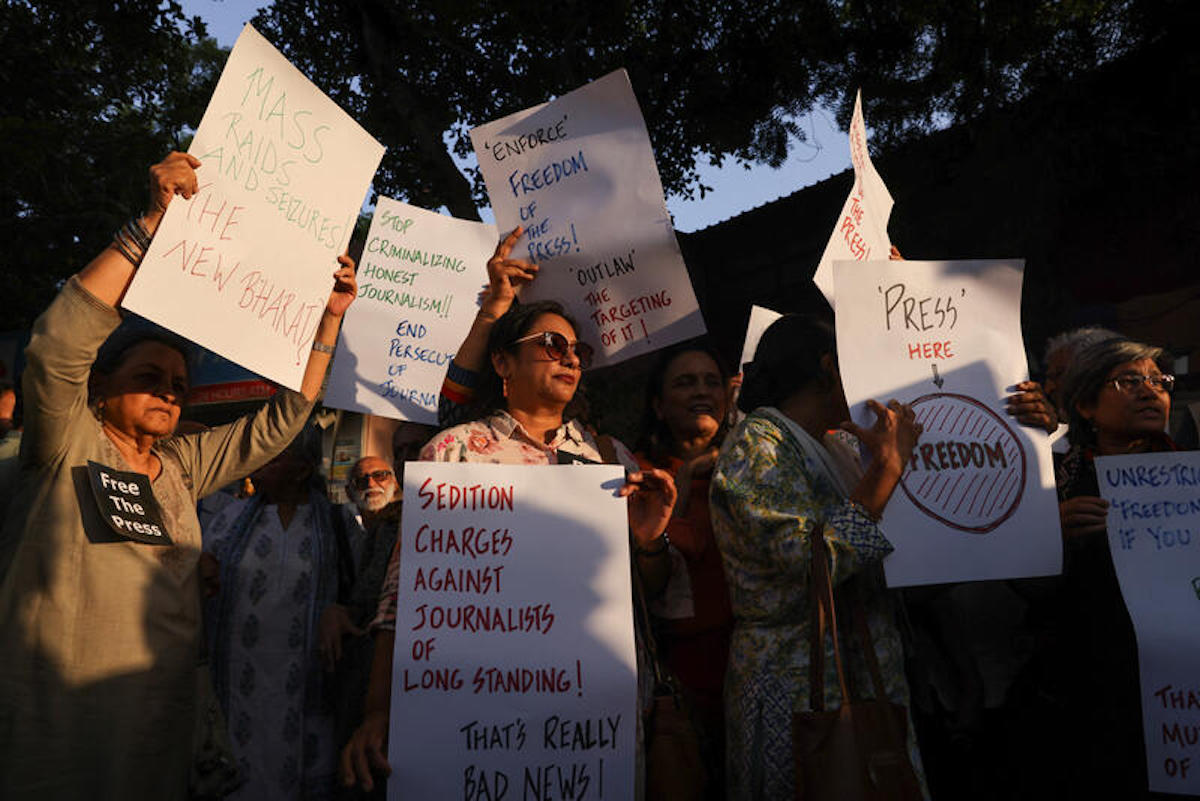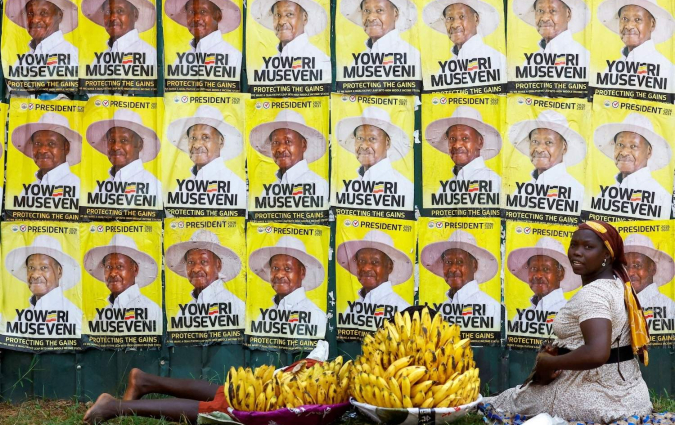Inside Modi’s crackdown on the foreign press in India

Members of the media protest after the Indian police raided the New Delhi office of a news portal and the homes of journalists linked to it in October 2023. REUTERS/Anushree Fadnavis
On 20 June, Sébastien Farcis, a French journalist working for Radio France Internationale, Libération and the Swiss and Belgian public radios, announced on Twitter that India’s government refused to renew his work permit. He wrote they had given no explanation for preventing him from practising his profession and “depriving me of all my income.” Farcis had left India three days before.
Three years before, in March 2021, Indian authorities made it imperative for foreign correspondents who had the Overseas Citizen of India (OCI) card by virtue of being married to an Indian citizen, to obtain a work permit. Farcis was denied such a permit despite having been married to an Indian national and having worked in India for 13 years.
Farcis and two other foreign journalists have been forced to leave the country this year as their journalist work permits were not renewed.
In April, Avani Dias, who worked as ABC News South Asia bureau chief, said that the Indian government denied her a visa extension after she published a report on the killing of a Sikh separatist. Canada has accused Indian government agents to be involved in this crime. Her report is still blocked on YouTube in India.
“It felt too difficult to do my job in India. I was struggling to get into public events run by Modi’s party. The government wouldn’t even give me the passes I needed to cover the election,” she said in a podcast she published after leaving the country. “This is done by design. The Narendra Modi government has made me feel so uncomfortable that we decided to leave.”
Dias received a visa extension to cover the 2024 elections just a day before she was scheduled to leave the country. By then, she said, it was too late.
About 30 foreign correspondents based in India – reporting for Financial Times, the Washington Post, France 24, the Guardian, the New York Times, the Wall Street Journal and others – signed an open letter protesting the treatment meted out to Dias. Some of the above-mentioned organisations have bureaus in India, employing anywhere between two and 12 people each.
A journalist permit was denied to another French journalist, Vanessa Dougnac. “Instantly, and without explanation, I lost the right to write articles,” she said later. “My blood froze.”
Based in Delhi, Dougnac was married to an Indian national and worked as the regional correspondent for French, Swiss, and Belgian newspapers for more than two decades. The Indian government said she had violated “rules and regulations.”
In an essay she wrote after leaving India, Dougnac said: “Journalists and sources believed I was the subject of a vendetta at the highest level and that my case would not be unblocked. They gave me one piece of advice: leave the country.”
A government propaganda site branded Dougnac an "anti-Hindu journalist."
Speaking to the Indian website Newslaundry, Kanchan Gupta, senior adviser with the broadcasting ministry, said the Indian process of giving permits or granting visas is “as open or as opaque as it is in the US, UK or any other country”.
On the government’s refusal to share reasons for the denial of permission, Gupta argued that visas and work permits are a privilege and not a right for foreign nationals across the world. “No country offers an explanation as to why visas or work permits have been denied,” he said.
According to the New Delhi’s Foreign Correspondents Club, there are at least 70 foreign nationals in India with a permit to practise journalism. As some freelance journalists and others are not registered with the Club, the real number might be higher and is constantly fluctuating.
Modi and the foreign press
The foreign press has had a particularly hard time navigating the 10 years under Prime Minister Modi. In February 2023, BBC offices in India were searched as part of an investigation by income tax authorities, a few days after the channel aired a documentary critical of Modi. The documentary remains unavailable in India. In addition, groups that favour the government filed several defamation suits against the BBC.
Foreign correspondents have spoken to multiple media outlets anonymously and said that since Narendra Modi’s second term as Prime Minister, they have been “facing visa uncertainty, denial of travel permits, even deportation threats.”
Between January 2020 and February 2022, the Foreign Correspondents Club in Delhi conducted three internal surveys to understand the curbs on their freedom. Scroll.in reported that many of the 40-odd journalists surveyed left anonymous comments stating that they had been “summoned” by officials and ministers and shown “files” and “spreadsheets” detailing their “negative coverage.”
A journalist who works as a freelancer for several European media outlets only spoke to me on the condition of anonymity, as they were afraid there would be negative consequences of speaking out against the government.
“We were scared to leave names even on a survey like this,” they said. “You can imagine the extent of fear and intimidation.”
What's different now?
Canadian journalist Stephanie Nolen, who reported from India from 2008 to 2013 for the Globe and Mail, told me that she was summoned by authorities and rebuked for her critical coverage of caste by the previous administration. However, she said, “they would express displeasure with you, but not force you out of the country.”
In May 2016, India’s External Affairs Ministry sent out a notice to foreign correspondents reiterating that travel permits were required to report from several Indian states.
“I was reporting from Nagaland and Sikkim at that point of time,” said a foreign correspondent who spoke to me anonymously, referring to the states in the Northeastern region of the country. This journalist explained that the restrictions were not new but said that authorities had turned a blind eye to them until then if the reports were on culture, history and art. At this point, however, the government started taking this seriously.
“I rushed back to Delhi and ended up not completing those reports,” the journalist said. “I heavily self-censor now and avoid stories that might raise serious questions. This is not why I came to the country,” they said. “If things continue this way, I might go elsewhere to report.”
In August 2019, New Delhi brought the territory of Jammu and Kashmir under its direct control. After this, the restrictions on foreign media were extended to the entire territory and were implemented very strictly. According to a report in Scroll.in no foreign correspondent has since independently gone on a reporting trip to the Kashmir valley.
Another foreign correspondent who spoke to me on the condition of anonymity said that their visa was extended only for six months at a time. This made it impossible for this person to move their family to India or even plan for stories that took longer than six months to report. “No deep investigation is possible,” they said, adding that self-censorship was always there, but now the list of issues that they think twice about before reporting on have increased.
They had come to India after having reported in several countries. “It has never been so tough for me to get official sources to comment on my stories,” they said. “When I don't mention one side of the story, my credibility as a reporter goes down.”
A long and troubled history
The Reuters Institute’s Journalist Fellow Jun Suzuki, who is a Desk Editor at Nikkei Asia, writes in a project he published recently, that foreign correspondence evolved with advancements in transport and telecommunications, increasing the need for specialised reporters in the early 19th century. A few decades later, news agencies like Reuters and Associated Press were established. By the 20th century, foreign correspondents were regarded as elite, cosmopolitan figures.
In colonial India, journalism in English, mostly by British journalists, was highly censored. The first newspaper in India is widely acknowledged as The Bengal Gazette, launched by James Augustus Hickey in 1780. The paper lasted only about two years before being seized by the British administration in 1782 for its outspoken criticism of the British Raj.
In independent India, one of the first biggest challenges foreign journalists faced occurred in June 1975, when Indira Gandhi declared a state of emergency in the country. Around 200 journalists, including some foreign correspondents, were arrested. For two days, no newspaper was published in the country.
“Strict censorship has prevented the once lively Indian press (some 830 daily newspapers) from printing anything other than official handouts about the crisis,” TIME magazine’s correspondent William Stewart wrote in an article titled India: Indira Gandhi’s Dictatorship Digs In.
Canadian journalist Stephanie Nolen, who is currently a global health reporter for the New York Times, told me that “fundamentally, the foreign correspondent model is a very colonial and patronising model.”
She was referring to the idea that most foreign correspondents are Western journalists who often parachute to different countries to report back to a largely Western audience. She acknowledged, though, that things need not remain that way. Local journalists have a strong voice, she said, which deserves highlighting.
However, Nolen also added that there is value in having someone from “outside” looking into a country. “You see motivations and actions that people from that place don't see or can't tell you,” she said.
In the letter that French journalist Dougnac wrote after she departed from the country, she recollects her collaborators in South Asia. “Messages of support and solidarity poured in. My collaborators in India, Pakistan, Nepal, Bangladesh, and Sri Lanka wrote me warm words. For two decades, they had been my travelling companions. Together, we witnessed the history of the subcontinent.”
Since the country opened up to international markets in 1991, the Indian media underwent massive changes.
Advancements in satellite technology also helped faster transmission of news and challenge the foreign correspondent model. “The acceleration of the news cycle and the arrival of digital technology started to challenge the routines and exclusivity of international reporting,” according to a study by Richard Sambrook from Cardiff University.
Many Indian newspapers and television channels began sending their correspondents to cover violence in the Middle East or to UN conferences.
Why outsiders matter
Pulitzer Prize-winning journalist Geeta Anand, who is currently Dean and Professor of Journalism at University of California at Berkeley, was a correspondent for the Wall Street Journal in India before the Modi administration. In an interview, she explained how she tried to report stories that the Indian press would find hard to cover, either because of lack of resources or because they were more vulnerable to the vagaries of the establishment.
In a climate that has been so hostile for Indian reporters, foreign correspondents who report for big global news organisations have some degree of security, said Anand. They have the resources to fight legal cases that might arise from their reporting, and the luxury to travel and spend months on a story. “All this makes the profession worthwhile,” said Nolen, the Canadian journalist who now works for the New York Times.
Indian journalists are more vulnerable to legal cases being slapped against them or other kinds of retribution. “For a foreign journalist, it is only a matter of not renewing their work permit,” said a member of a foreign correspondents club.
In her departing letter, Avani Dias wrote: “If there's one thing I've learnt, it's that Modi – and his government – can be openly resistant to accountability.”
In every email we send you'll find original reporting, evidence-based insights, online seminars and readings curated from 100s of sources - all in 5 minutes.
- Twice a week
- More than 20,000 people receive it
- Unsubscribe any time
signup block
In every email we send you'll find original reporting, evidence-based insights, online seminars and readings curated from 100s of sources - all in 5 minutes.
- Twice a week
- More than 20,000 people receive it
- Unsubscribe any time






